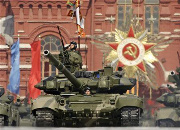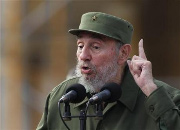Romney right on Russia and Fidel Castro agrees
By Toby Westerman
Republican Presidential candidate Mitt Romney's description of Russia as America's "number one geopolitical foe" runs afoul of both the Obama administration's "Reset" of Russian-American relations and heavy U.S. private financial investment directed into the Russian Federation.
 Pro-Russian sentiment crosses traditional party lines, from Vice President Joe Biden who ridiculed Romney as believing that the Cold War is "still on" to George Bush's former U.S. Secretary of State Condoleezza Rice, who sees the possibility of an innovation partnership between the United States and Russia.
Pro-Russian sentiment crosses traditional party lines, from Vice President Joe Biden who ridiculed Romney as believing that the Cold War is "still on" to George Bush's former U.S. Secretary of State Condoleezza Rice, who sees the possibility of an innovation partnership between the United States and Russia.
There is, however, one universally recognized expert on Russia and the former Soviet Union who seems, at least partially, to share Romney's view of the Russian state as an increasingly powerful adversary of the U.S.
That expert is Fidel Castro, founder of Communist Cuba and, until his retirement, the longest ruling dictator in modern history.
In a March 30, 2012 state-controlled RIA Novosti carried an article, without comment, referring to recent statements made by Castro, who declared that the present Russian government is actively working to "restore the lost state power" of the old Soviet Union.
 The collapse of the Soviet Union in 1991 was "not a surprise" to those acquainted with "the events, ideas, and historical processes" then in play, said Castro.
The collapse of the Soviet Union in 1991 was "not a surprise" to those acquainted with "the events, ideas, and historical processes" then in play, said Castro.
"Today, Russia's leaders are trying to restore a powerful state, which was created by so many efforts and so many hardships," proclaimed the former tyrant.
Castro left aside the millions of murders which were also involved in the establishment and continuation of the USSR and its sister Communist nations.
Castro's remarks should be read in light of an earlier statement asserting that the fall of the Soviet Union was "naïve and inadvertent." In this manner, Castro denies any triumph of the democratic spirit or the failure of Marxist-Leninist theory, and lays the responsibility of the fall of the Soviet Union on the shoulders of Soviet rulers of that time. Castro's remarks, made to the visiting former Director General of UNESCO, Federico Mayor, were broadcast over Radio Havana Cuba in June 2000.
The present internal and external policies which Moscow is now following support the assertions of both Castro, who sees a Soviet revival, and Romney, who warns of the dangers of an anti-American Russian state.
 In recent public statements, newly re-elected Russian president Vladimir Putin asserted that one of the top priorities of his new administration will be the "integration" of post-Soviet states into one united, geopolitical entity. In view of his earlier and much quoted opinion that the collapse of the USSR was the "greatest geo-political catastrophe of the 20th century," one may reasonably conclude that Putin's "integration" scheme will lead to some form of new (and in the thinking of Communists, improved) version of the USSR.
In recent public statements, newly re-elected Russian president Vladimir Putin asserted that one of the top priorities of his new administration will be the "integration" of post-Soviet states into one united, geopolitical entity. In view of his earlier and much quoted opinion that the collapse of the USSR was the "greatest geo-political catastrophe of the 20th century," one may reasonably conclude that Putin's "integration" scheme will lead to some form of new (and in the thinking of Communists, improved) version of the USSR.
The process of "integration" of the members of the old Soviet Union is not new. Russia has already established a "Union State" with European pariah nation Belarus. Moscow has sought in various ways to unite the remaining parts of the former Soviet empire under its leadership for years, but the effort is now receiving new emphasis from Putin.
In Russia itself, the shift from the present so-called "Managed Democracy" to some sort of born again Communist government is becoming increasingly obvious. For years there have been consistent assertions by dissidents that there is a de facto police state domination of the Russian state. The late (d. 2011) Elena Bonner, a dissident in the Soviet Union and also in the "new" Russia, openly declared in 2004 that "Russia is under the control of the KGB."
In reality, Russia may be the first nation ever to be controlled by its intelligence services.
The first overt sign of a publically acknowleded return to the Soviet past may well have already appeared, but has gained no publicity in the West. In the campaigning preceding the December 2011 Russian parliamentary elections, the ruling United Russia party, which has Putin for its leader, adopted a number of banner designs and slogans of the Communist Party "opposition."
The concept of an "opposition" party, however, is itself invalid in "democratic" Russia. Domestic policy differences among the leading political factions are relatively slight, and in foreign policy no major Russian politician has voiced opposition to Moscow's close ties to Stalinist North Korea, the Euro-pariah state of Belarus, or the tropical gulag of Communist Cuba.
Russia's decade and a half history of providing technical, scientific, and military aid to Communist China has likewise gone unopposed. Russia was the first nation to provide arms and training to China's still ongoing arms modernization and buildup.
Moscow is also in the process of remedying one of the major flaws that contributed significantly to the collapse of the Soviet Union: technological and scientific inferiority to the West, particularly the United States.
 In the suburbs of Moscow, Russia has launched a major effort to construct its own version of America's Silicon Valley. Referred to as the Skolkovo Foundation, the goal is to construct an "innovation city" which accommodates technical expertise and advanced business training. A twelve month MBA, specializing in entrepreneurial skill, is even offered on site at Skolkovo.
In the suburbs of Moscow, Russia has launched a major effort to construct its own version of America's Silicon Valley. Referred to as the Skolkovo Foundation, the goal is to construct an "innovation city" which accommodates technical expertise and advanced business training. A twelve month MBA, specializing in entrepreneurial skill, is even offered on site at Skolkovo.
Both Biden and Rice have visited Skolkovo and praised Russia's gleaming new technology center.
While it remains to be seen exactly how Skolkovo's entrepreneurial training will be used, one set of what may be called entrepreneurial skills is already very much in play. Moscow's espionage services are already working at a Cold War level according to statements from the FBI, and are directed, for the most part, at the U.S.
The arrest of 10 Russian spies in 2010, including the now well-known "Anna Chapman" (real name, Anya Kushchenko), gave the public a glimpse into Moscow's spy campaign. The most important aspect of the case is that those involved had been operating for a decade in the United States leading double lives. A heavy commitment of time and money is required to field this kind of professional intelligence officer.
The purpose of these spies was to both gain influence over American policy making and to gather information deemed beneficial to Moscow. It is nothing less than a covert act of aggression.
Several other incidents of long-term spy operations have been uncovered over the years, which leads to the unmistakable conclusion that there is a continuity in espionage by Moscow against the U.S. extending from the Soviet era to the present day.
Russia's espionage services have been consistently and heartily supported by Putin, an ex-KGB spy master. "Anna Chapman" and the other members of her broken Russian spy ring were no exception.
Putin and other retired or still serving intelligence officers proudly call themselves "Chekists," a reference to the feared Bolshevik secret police, the Cheka. In so doing, today's Russian spies declare a direct link between today's Russian spy services and one of the bloodiest internal security organizations that ever existed.
In addition to its espionage activities, Moscow is also placing great emphasis on fundamentally transforming its military, from the overhaul of command and control operations to the procurement of the most up to date technology possible. (An undeclared function of the Skolkovo Foundation?).
100 ton atomic weapons aimed at the U.S., updated nuclear submarines and fighter jets, and advanced small arms technology point to Russia's determination to recapture Soviet superpower status.
Romney is right about Russia, possibly even more than he realizes.
© Toby Westerman
April 22, 2012
Republican Presidential candidate Mitt Romney's description of Russia as America's "number one geopolitical foe" runs afoul of both the Obama administration's "Reset" of Russian-American relations and heavy U.S. private financial investment directed into the Russian Federation.
 Pro-Russian sentiment crosses traditional party lines, from Vice President Joe Biden who ridiculed Romney as believing that the Cold War is "still on" to George Bush's former U.S. Secretary of State Condoleezza Rice, who sees the possibility of an innovation partnership between the United States and Russia.
Pro-Russian sentiment crosses traditional party lines, from Vice President Joe Biden who ridiculed Romney as believing that the Cold War is "still on" to George Bush's former U.S. Secretary of State Condoleezza Rice, who sees the possibility of an innovation partnership between the United States and Russia.There is, however, one universally recognized expert on Russia and the former Soviet Union who seems, at least partially, to share Romney's view of the Russian state as an increasingly powerful adversary of the U.S.
That expert is Fidel Castro, founder of Communist Cuba and, until his retirement, the longest ruling dictator in modern history.
In a March 30, 2012 state-controlled RIA Novosti carried an article, without comment, referring to recent statements made by Castro, who declared that the present Russian government is actively working to "restore the lost state power" of the old Soviet Union.
 The collapse of the Soviet Union in 1991 was "not a surprise" to those acquainted with "the events, ideas, and historical processes" then in play, said Castro.
The collapse of the Soviet Union in 1991 was "not a surprise" to those acquainted with "the events, ideas, and historical processes" then in play, said Castro."Today, Russia's leaders are trying to restore a powerful state, which was created by so many efforts and so many hardships," proclaimed the former tyrant.
Castro left aside the millions of murders which were also involved in the establishment and continuation of the USSR and its sister Communist nations.
Castro's remarks should be read in light of an earlier statement asserting that the fall of the Soviet Union was "naïve and inadvertent." In this manner, Castro denies any triumph of the democratic spirit or the failure of Marxist-Leninist theory, and lays the responsibility of the fall of the Soviet Union on the shoulders of Soviet rulers of that time. Castro's remarks, made to the visiting former Director General of UNESCO, Federico Mayor, were broadcast over Radio Havana Cuba in June 2000.
The present internal and external policies which Moscow is now following support the assertions of both Castro, who sees a Soviet revival, and Romney, who warns of the dangers of an anti-American Russian state.
 In recent public statements, newly re-elected Russian president Vladimir Putin asserted that one of the top priorities of his new administration will be the "integration" of post-Soviet states into one united, geopolitical entity. In view of his earlier and much quoted opinion that the collapse of the USSR was the "greatest geo-political catastrophe of the 20th century," one may reasonably conclude that Putin's "integration" scheme will lead to some form of new (and in the thinking of Communists, improved) version of the USSR.
In recent public statements, newly re-elected Russian president Vladimir Putin asserted that one of the top priorities of his new administration will be the "integration" of post-Soviet states into one united, geopolitical entity. In view of his earlier and much quoted opinion that the collapse of the USSR was the "greatest geo-political catastrophe of the 20th century," one may reasonably conclude that Putin's "integration" scheme will lead to some form of new (and in the thinking of Communists, improved) version of the USSR.The process of "integration" of the members of the old Soviet Union is not new. Russia has already established a "Union State" with European pariah nation Belarus. Moscow has sought in various ways to unite the remaining parts of the former Soviet empire under its leadership for years, but the effort is now receiving new emphasis from Putin.
In Russia itself, the shift from the present so-called "Managed Democracy" to some sort of born again Communist government is becoming increasingly obvious. For years there have been consistent assertions by dissidents that there is a de facto police state domination of the Russian state. The late (d. 2011) Elena Bonner, a dissident in the Soviet Union and also in the "new" Russia, openly declared in 2004 that "Russia is under the control of the KGB."
In reality, Russia may be the first nation ever to be controlled by its intelligence services.
The first overt sign of a publically acknowleded return to the Soviet past may well have already appeared, but has gained no publicity in the West. In the campaigning preceding the December 2011 Russian parliamentary elections, the ruling United Russia party, which has Putin for its leader, adopted a number of banner designs and slogans of the Communist Party "opposition."
The concept of an "opposition" party, however, is itself invalid in "democratic" Russia. Domestic policy differences among the leading political factions are relatively slight, and in foreign policy no major Russian politician has voiced opposition to Moscow's close ties to Stalinist North Korea, the Euro-pariah state of Belarus, or the tropical gulag of Communist Cuba.
Russia's decade and a half history of providing technical, scientific, and military aid to Communist China has likewise gone unopposed. Russia was the first nation to provide arms and training to China's still ongoing arms modernization and buildup.
Moscow is also in the process of remedying one of the major flaws that contributed significantly to the collapse of the Soviet Union: technological and scientific inferiority to the West, particularly the United States.
 In the suburbs of Moscow, Russia has launched a major effort to construct its own version of America's Silicon Valley. Referred to as the Skolkovo Foundation, the goal is to construct an "innovation city" which accommodates technical expertise and advanced business training. A twelve month MBA, specializing in entrepreneurial skill, is even offered on site at Skolkovo.
In the suburbs of Moscow, Russia has launched a major effort to construct its own version of America's Silicon Valley. Referred to as the Skolkovo Foundation, the goal is to construct an "innovation city" which accommodates technical expertise and advanced business training. A twelve month MBA, specializing in entrepreneurial skill, is even offered on site at Skolkovo.Both Biden and Rice have visited Skolkovo and praised Russia's gleaming new technology center.
While it remains to be seen exactly how Skolkovo's entrepreneurial training will be used, one set of what may be called entrepreneurial skills is already very much in play. Moscow's espionage services are already working at a Cold War level according to statements from the FBI, and are directed, for the most part, at the U.S.
The arrest of 10 Russian spies in 2010, including the now well-known "Anna Chapman" (real name, Anya Kushchenko), gave the public a glimpse into Moscow's spy campaign. The most important aspect of the case is that those involved had been operating for a decade in the United States leading double lives. A heavy commitment of time and money is required to field this kind of professional intelligence officer.
The purpose of these spies was to both gain influence over American policy making and to gather information deemed beneficial to Moscow. It is nothing less than a covert act of aggression.
Several other incidents of long-term spy operations have been uncovered over the years, which leads to the unmistakable conclusion that there is a continuity in espionage by Moscow against the U.S. extending from the Soviet era to the present day.
Russia's espionage services have been consistently and heartily supported by Putin, an ex-KGB spy master. "Anna Chapman" and the other members of her broken Russian spy ring were no exception.
Putin and other retired or still serving intelligence officers proudly call themselves "Chekists," a reference to the feared Bolshevik secret police, the Cheka. In so doing, today's Russian spies declare a direct link between today's Russian spy services and one of the bloodiest internal security organizations that ever existed.
In addition to its espionage activities, Moscow is also placing great emphasis on fundamentally transforming its military, from the overhaul of command and control operations to the procurement of the most up to date technology possible. (An undeclared function of the Skolkovo Foundation?).
100 ton atomic weapons aimed at the U.S., updated nuclear submarines and fighter jets, and advanced small arms technology point to Russia's determination to recapture Soviet superpower status.
Romney is right about Russia, possibly even more than he realizes.
© Toby Westerman
The views expressed by RenewAmerica columnists are their own and do not necessarily reflect the position of RenewAmerica or its affiliates.
(See RenewAmerica's publishing standards.)

















